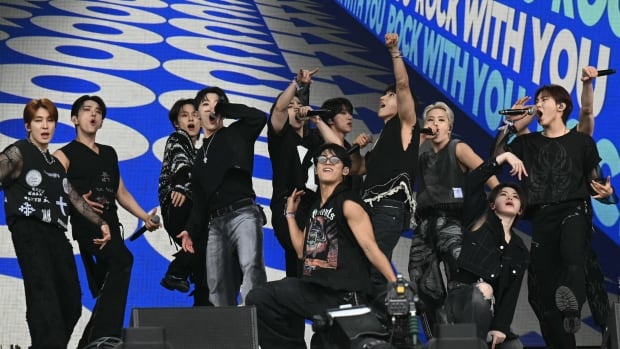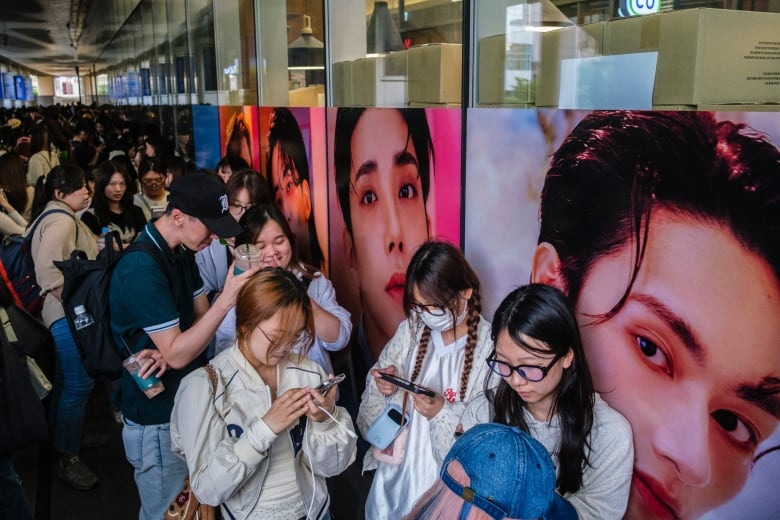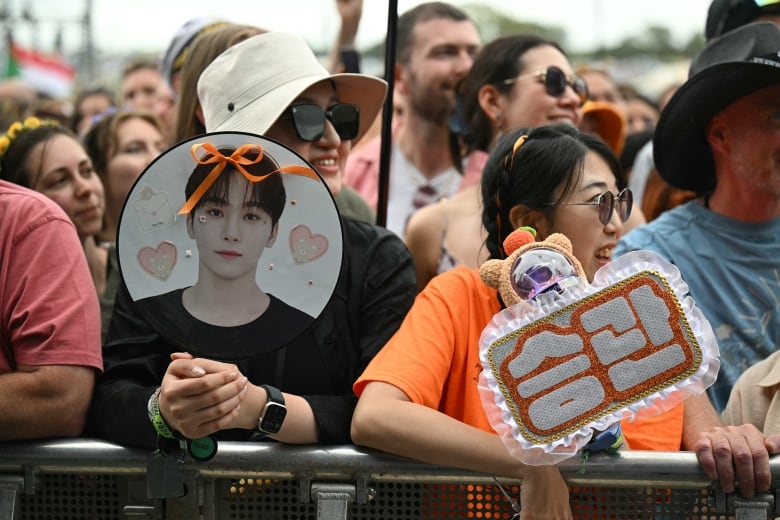
The Current24:23K-Pop is experimenting with AI, but some are skeptical
One of the biggest music genres is experimenting with the power of artificial intelligence after K-pop group Seventeen used AI to help promote the music video for its single Maestro.
The song is a hit, but the use of AI in the multi-billion dollar industry has been met with mixed reviews.
“Some people are really for it. Some people are very much against it. But the use of generative AI, I think, is kind of here to stay,” Michelle Cho, assistant professor of Korean Studies at the University of Toronto, told The Current guest host Rebecca Zandbergen.
The music video for Maestro features the 13 group members performing while surrounded by robots and other bits of technology.
The teaser trailer, released in April, features segments created by generative AI, and shows people playing classical music with robots in the background, and robots playing what looks like some sort of high-tech keyboard.
“The entire theme of Maestro is a kind of commentary on the way that humans and their creative energy [are] being threatened by media technologies,” said Cho.
K-pop is a multi-billion-dollar industry, with South Korea coming in as the seventh-largest music market globally in 2023, according to the International Federation of the Phonographic Industry. With so much money to be made, artists and agencies are looking for ways to use AI in new ways.
WATCH | Teaser trailer for Seventeen’s Maestro:
What is AI used for?
Cho says Seventeen’s members are known in the K-pop community for being involved in writing their music and choreographing their performances.
And with the popular group BTS on hiatus during their mandatory military service in South Korea, Seventeen has taken advantage of the opening. The group sold 16 million albums last year.
But the group sparked controversy in April when comments made by one of the band members, Woozi, had people wondering if the group used generative AI to write songs for its latest album. He has since denied the claims, saying the group’s music is “written and composed by human creators.”
“A lot of fans have used social media platforms to express their anger at the way that the group has been misrepresented because fans, I think, don’t necessarily support AI’s use or the idea that the creativity of the performers should be overshadowed by AI,” said Michelle.
But it’s clear K-pop groups are finding ways to use generative AI. Bernie Cho, president of the creative agency DFSB Kollective, says it has has become ubiquitous in the K-pop industry.

He says some artists use AI to translate their lyrics, helping artists create songs in languages they couldn’t otherwise sing in.
“I work with indie artists who very much want to go more global, faster, bigger, better, and they’re using AI to quickly translate their Korean lyrics into multiple languages,” Bernie Cho said.
Groups also use AI to make art, he says, not just for albums but for every single they release, giving each song a unique feel.
There are even artists that use AI to create artificially generated performers that sing and dance, all with a real person behind the wheel finessing the project.
“We’re starting to see AI bands fighting for chart rankings with real bands,” said Bernie Cho.
And since the work still requires someone pulling the strings, he says he isn’t concerned about AI taking over the industry.
“I don’t think it’ll put me out of work in the sense. If anything, it’ll allow me to do more work faster, better, bigger, easier. And so, if anything, I’m very grateful for the advent of AI.”

Legal concerns surrounding generative AI
AI does have a handful of challenges to face in both K-pop and other genres.
Fans have yet to totally buy into the idea of an act made up solely of AI, in part because there’s a lot a AI can’t do, like sign autographs or meet fans in person.
“Although it looks cool from afar … what we’re hearing from fans is that it’s not that cool. It’s actually a little bit cold,” said Bernie Cho.
Charlie Harding, a music journalist and host of the Switched on Pop podcast, says there’s also quality to consider.
“Generally we like to hear songs that we believe are being made by an artist, speaking to some interior truth,” he said.
Then there are the legal disputes. Artists are looking for more protection from AI that scans their work to create its own.
Major music groups such as Universal Music Group, Warner Music Group and Sony Music group have all filed lawsuits against AI music generators Suno and Udio.
In May, the South Korean government announced plans to revise copyright laws surrounding AI, to “bolster the development of the AI-based creative industry.”
Efforts like these could change how the industry uses AI, Harding says.
“If we start to see precedents come through in court cases that say, ‘No, you can’t do that’ … those cases could really determine the future of how we use these large language models,” he said.
“I think that artificial intelligence in some form is here to stay. As it is today, it’s use is very much to be determined.”